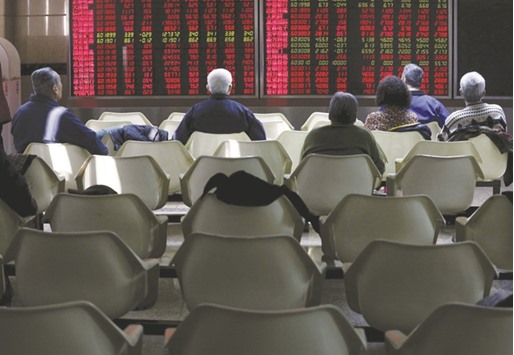Asian shares mostly fell yesterday but Chinese markets rallied, with reports Beijing had spent billions buying shares after a more than 7% decline in the first two trading days of the year.
The South Korean won sank against the dollar after North Korea announced it had conducted its fourth nuclear test, although there was little wider impact on regional equities—with one analyst saying dealers were looking at “more serious issues”.
Shanghai finally chalked up some gains as the country’s central bank pumped cash into the beleaguered financial system. Experts said it was used to shore up stocks to avert a repeat of last summer’s rout that saw trillions of dollars wiped off valuations.
The People’s Bank of China also set its daily yuan reference rate against the dollar at its lowest level in almost five years, according to Bloomberg News.
But analysts warned the moves would cause more problems down the line as China’s economy, the world’s second biggest and a key driver of global growth, heads for its worst annual performance in a quarter of a century.
Stocks in Asia, which swung wildly Monday and Tuesday, extended a miserable start to 2016 – hit by another round of weak Chinese economic indicators, sinking oil prices and rising tensions in the Middle East.
Tokyo sank 1% as exporters were hurt by a strong yen, Hong Kong lost 1%, Sydney shed 1.2% and Taipei dropped 1.1%. Shanghai composite rose 2.3% at 3,361.84 points.
“There’s word spreading in the market that state funds are buying, but the idea is to hold up the market, not to bolster it by a large margin,” said Dai Ming, a fund manager at Hengsheng Asset Management Co in Shanghai.
“The market has basically stabilised after the tumble and investors are waiting for further policies that will boost sentiment.”
Regulators had closed trading early Monday because a 7% fall triggered a new circuit breaker put in place during the summer to prevent sharp losses or gains.
Investors were partly spooked by this Friday’s expiration of a ban imposed in July on certain investors selling stocks.
Bloomberg News reported Tuesday that regulators had asked the nation’s exchanges to tell companies that the ban would remain in force. The regulator did not confirm the report.
Some emerging-nation markets enjoyed gains on news of the bank intervention, with Jakarta and Kuala Lumpur higher.
However, Jorge Mariscal, the emerging-markets chief investment officer at UBS Wealth Management, said in New York that “these sorts of measures are going to backfire”.
There was little reaction to North Korea’s announcement that it had tested a hydrogen bomb—its fourth nuclear test since 2006.
“We have more serious issues like the Chinese economy and tension in the Middle East,” said Yoshinori Shigemi, a global market strategist for JP Morgan Asset Management in Tokyo.
“I think investors will start refocusing on those issues.”
Seoul ended down 0.3%, having been 0.8% lower before the test. The won fell to 1,195.45 against the dollar, its weakest level in about three months.
Regional investors brushed aside a mild rebound Tuesday in US and European markets.
Dealers will be closely watching the release on Friday of US jobs data, seeking clues about the Federal Reserve’s timetable for another interest rate rise following last month’s hike—the first in almost a decade.
Currency investors moved into safer investments, with the dollar and yen climbing.
The greenback was sitting at one-month highs against the euro, with the single currency buying $1.0731, while the British pound was near one-year lows at $1.4638.

People look at an electronic board showing stock information at a brokerage house in Beijing. The Shanghai composite closed up 2.3% at 3,361.84 points yesterday.
